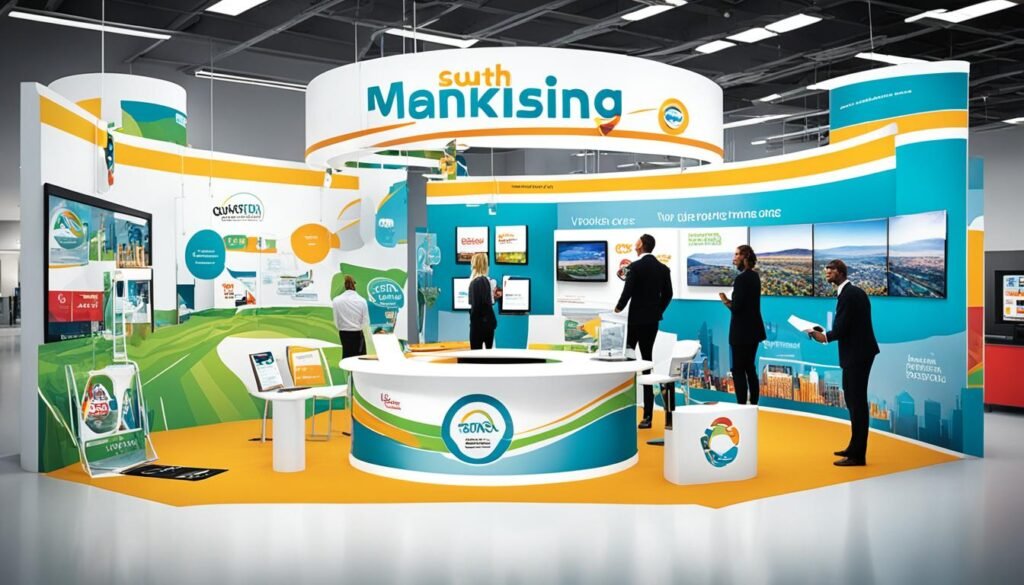Transcending traditional advertising, experiential marketing in South Africa has revolutionized the way brands connect with their audience. By crafting immersive brand experiences, companies are engaging customers on a more emotional and personal level. Interactive engagement strategies are being employed to establish a memorable dialogue between brands and their consumers, moving beyond mere transactions to create meaningful interactions.
An integral part of this innovative approach is event marketing solutions, which have been pivotal in facilitating the shift from conventional marketing methods to dynamic, live brand expressions. The success of customer experience activation hinges on its ability to provide participatory and hands-on engagements, thus forging more substantial connections with the brand. Experiential branding concepts have become a cornerstone for businesses aiming to stand out in a crowded marketplace and foster lasting relationships with their target demographic.
Key Takeaways
- Experiential marketing fosters deeper consumer-brand connections through personal and impactful experiences.
- Immersive brand experiences transcend traditional marketing methods, creating emotional ties and memories.
- Interactive engagement strategies contribute to memorable campaigns that resonate with consumers.
- Event marketing solutions offer participatory experiences that elevate brand visibility and engagement.
- Experiential branding in South Africa is reshaping the customer journey into one that is interactive and emotionally charged.
- Customer experience activation through live events and installations is proven to enhance customer loyalty.
Innovative Experiential Campaigns Captivate South African Consumers
In the bustling markets of South Africa, brands are increasingly turning to experiential campaigns to forge lasting impressions with consumers. Not your ordinary marketing strategies, these campaigns take the shape of vibrant pop-up stores and interactive installations, each meticulously engineered to capture the imagination and inspire brand loyalty.
By collaborating with a seasoned experiential marketing agency, companies are crafting events and spaces designed for maximum consumer engagement. These agencies understand the importance of immersive brand experiences in today’s competitive landscape and they harness this to propel their clients to new heights.
Emerging Trends in Interactive Installations and Pop-Up Stores
It’s clear that the South African consumer landscape is evolving—the advent of pop-up stores and interactive installations offers a testament to this progression. These temporary havens of brand immersion allow for a playful yet potent avenue of consumer interaction, turning shopping trips into experiential adventures. Not only do they create an exciting buzz, but they also serve as powerful event marketing solutions with their ability to attract and maintain public interest.
Case Study: Adidas Originals and the Impact of Immersive Brand Experiences
Take, for example, the Adidas Originals pop-up store, a masterclass in experiential marketing that transformed retail into a palpable narrative. This wasn’t just a store; it was an experience, strategically designed to weave the customer into the fabric of the brand—offering not only a product but a story and an adventure. Such brand experiences resonate deeply, far beyond the confines of traditional commerce.
The Role of Experiential Stunts in Brand Awareness: K-Way’s Ice Wall Climbing Challenge
Similarly daring experiential stunts, like K-Way’s Ice Wall Climbing Challenge, have left indelible marks on consumer consciousness. These stunts go far beyond mere novelty; they generate excitement and dialogue in the community, creating memorable mental bookmarks that are revisited every time the brand is encountered. Such innovative approaches epitomize modern event marketing solutions, catapulting brand visibility and consumer engagement into new echelons.
In essence, these experiential campaigns excel in their ability to weave a narrative elixir that captivates, engages, and ultimately endears South African consumers to brands in a way that few other strategies can rival.
Experiential Marketing: A Game-Changer in the B2B Sector
The profound evolution within experiential marketing is charting a new course for B2B growth. Beyond the confines of standard sales pitches, businesses in South Africa are engaging in connection-focused events and creating an ecosystem that thrives on intimate understanding and mutual respect between companies.

Creating Connection-Focused Events for B2B Audience
Events designed with the B2B audience in mind prioritize interaction and hands-on experience. This is not just about presenting a product, but rather about constructing a milieu where immersive brand experiences are paramount. Through methods that emphasize interactive engagement strategies, companies are not just transmitting information, they are inviting their clients to be part of a joint narrative – one that unfolds through each handshake, presentation, and networking opportunity.
From the Carling Black Label Cup to Conferences: Driving Growth Through Experiential Tactics
The Carling Black Label Cup serves as a testament to the power of experiential marketing in the spectrum of high-profile events. Transcending mere viewership, it actively involves the audience in the action, thereby solidifying business relationships. Likewise, conferences are more than informative platforms; they are hubs where thought leadership flourishes and brands solidify their market positioning by showcasing insightful industry mastery and technological advancements.
Personalized Client Engagements for Strengthening B2B Relationships
Personalized client engagements act as the cornerstone of long-term business associations. Tailored experiences create bespoke impressions, not quickly forgotten. From custom gifts to events that reflect a deep understanding of client needs, these unique interactions foster enduring bonds. This highly specialized approach in experiential marketing enriches client rapport and seeds loyalty that translates into sustained commercial success.
Building Emotional Bonds Through Experiential Brand Activism
In the realm of marketing, South African brands are increasingly harnessing the power of experiential marketing to drive social change and champion civic causes. By tethering their campaigns to the core values and issues that matter most to their consumers, these companies are not just promoting products – they are activating customer experience and advocating for progress.
True experiential branding concepts are not just about the spectacle; they’re about inspiring real, positive change in the community.
Brand activism in South Africa involves more than just advocating for a cause; it translates into actual events and initiatives that consumers can participate in. Such participation galvanizes communities and turns passive observers into active supporters, all while encouraging positive associations with the brand.
For brands, this authentic form of engagement—customer experience activation—is proving crucial in establishing lasting emotional connections with consumers. Through well-crafted experiential branding concepts, brands like Nike have made significant strides in engaging South African consumers, not just with their products but with their ethos.
- By taking a stand on prevalent social issues, these businesses align themselves with the zeitgeist of the nation.
- The success of campaigns that involve brand activism demonstrates how social consciousness can foster a shared sense of purpose and community.
- It’s not just about commercial success; it’s about contributing to the social fabric of the country and building a legacy of positive impact.
Companies across South Africa are finding that experiential marketing, particularly when imbued with social purpose, does more than just sell – it resonates with the heart of the consumer. As a result, companies are increasingly investing in experiential marketing in South Africa to create impactful and memorable experiences for their target audience. By engaging consumers in real-life experiences that align with social causes or community initiatives, brands are able to forge deeper connections with their customers and demonstrate their commitment to making a positive impact. This approach not only drives loyalty and brand advocacy but also fosters a sense of purpose and connection between the company and its audience.
Guerrilla Marketing: Crafting Unexpected Encounters in South African Markets
In the evolving landscape of South African advertising, guerrilla marketing stands out as a dynamic driver of consumer engagement. This strategy hinges on the element of surprise, creating cost-effective viral campaigns that resonate deeply with the public psyche. Far from using the conventional billboard and TV advert model, it invites consumers to interact with brands in compelling and innovative ways, fostering interactive engagement strategies that can propel a brand’s presence virally, often with minimal financial investment.
Experiential campaigns are no longer a singular event but a holistic journey—where the audience becomes an integral part of a narrative that lives far beyond the campaign’s duration. Immersive brand experiences facilitated by guerrilla tactics not only spark conversation but build a long-lasting relationship with the audience.
KFC’s Bucket List Campaign: A Case Study in Innovative Guerrilla Tactics
Renowned for thinking outside the box, KFC hit the streets with their ‘Bucket List’ campaign, an experiential marketing agency dream come true. Turning the iconic KFC bucket into a pop-up experience, they captured consumers’ hearts and phone cameras, driving social shares and turning customers into brand ambassadors. The result? A clear testament to the power of guerrilla marketing’s impact and reach.
Nike’s ‘Just Do It: Vote’ Campaign and Its Influence on Civic Engagement
When Nike launched the ‘Just Do It: Vote’ campaign, they transcended the boundaries between commerce and civic responsibility. By leveraging their market influence, they encouraged young voters to make their voices heard, blending experiential campaigns seamlessly with causes of national importance. It was not just a campaign; it was a call to action that resonated with an entire generation, attributing to the ever-expanding realm of experiential campaigns in interactive engagement strategies.
Creating Cost-Effective, Viral Campaigns with High Impact
The mastery of guerrilla marketing within South Africa hinges on striking precisely when and where it is least expected, yet deeply felt. By laying the groundwork for experiential campaigns that cost less yet buzz more, brands can launch cost-effective viral campaigns that not only delight audiences but also bolster the brand’s bottom line. Such tactics indicate that with inventive thought and strategic precision, marketing magic can indeed be made on a shoestring budget.
Conclusion
In the dynamic world of marketing, experiential marketing has carved out a substantial niche in South Africa, proving its strength in fostering intimate connections between brands and consumers. This approach has redefined what it means to engage an audience, transitioning from passive to interactive engagement strategies that resonate on a deeper emotional level. South African companies have embraced this change, spearheading campaigns that unfold into immersive brand experiences that are not soon forgotten by those who partake.
The adoption of customer experience activation by renowned brands like Adidas and Nike showcases the ability of experiential marketing to transcend the confines of traditional marketing methods. Successful campaigns have led to the formation of experiential branding concepts that reach beyond the norm, creating a two-way relationship where customers are no longer just passive receivers but active participants in the brand’s narrative. This potent synergy between brand and consumer has resulted in a robust increase in loyalty and advocacy.
As we glance back at the various success stories from organizations that have harnessed the power of experiential techniques, it is evident that these strategies stand at the forefront of innovation in consumer engagement. Looking towards the future, experiential marketing continues to be a key player for brands aiming to leave a lasting mark on their market. It remains an essential component of the marketing repertoire, evidencing its place as an influential force in crafting memorable and meaningful interactions in the diverse and booming marketplace of South Africa.






